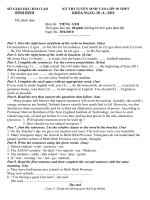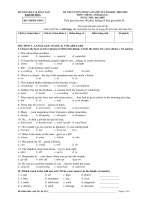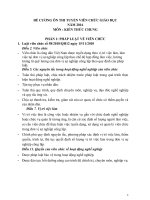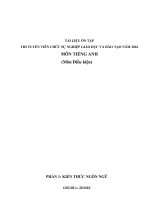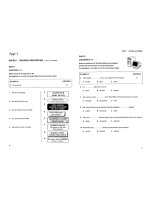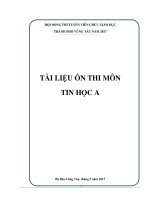Tai lieu thi tuyen vien chuc giao duc mon tieng anh tinh lao cai nam 2019 part03
Bạn đang xem bản rút gọn của tài liệu. Xem và tải ngay bản đầy đủ của tài liệu tại đây (384.85 KB, 12 trang )
ENGLISH LEVEL 2 GRAMMAR TOPICS
1. Adjectives – comparative – use of than and definite article
Use:
Use the comparative form to talk about how two things are different.
I am taller than you.
This book is thicker than that one.
Form:
1) If an adjective has one syllable, add er to the end. If it ends in e already, just add r.
tall => taller nice => nicer
thick => thicker late => later
2) If an adjective ends in one vowel and one consonant, write the consonant again, then
write er. But never write a w twice.
big => bigger new => newer (NOT newwer) thin => thinner slow => slower (NOT
slowwer) slim => slimmer
My brother is thinner than me.
3) If an adjective has two syllables and ends in y, change the y to i and add er.
funny => funnier silly => sillier
Which of these books is funnier?
5) Some adjectives have irregular superlative forms. These are listed below.
good => better
bad => worse
far => further
Add than after a comparative adjective to compare one thing with another. However, this is
not always necessary.
My house is smaller than yours.
2. Adjectives – superlative – use of definite article
Use:
Use the superlative form to describe something that is greater than any other thing.
The Amazon is the longest river in the world.
Helen is the most intelligent student in the class.
Form:
1)
Write the before all superlatives.
2)
If an adjective is short and has one syllable, add est to the end. If it ends
in e already, just add st.
tall
=>
the tallest
nice
=>
the nicest
thick
=>
the thickest
late
=>
the latest
2)
If an adjective ends in one vowel and one consonant, write the consonant again,
then write est. But never write a w twice.
big
=> the biggest
new
=> the newest (NOT newwest)
thin
=>
the thinnest
slow
=> the slowest (NOT slowwest)
slim
=>
the slimmest
The biggest cat in the world is the lion.
3)
If an adjective has two syllables and ends in y, change the y to i and add est.
funny =>
the funniest
silly
=>
the silliest
It’s the silliest film I’ve ever seen!
4)
For other adjectives with two or more syllables, DON’T add est. Write most before
the adjective.
interesting
=>
the most interesting
surprising
=>
the
most surprising
It’s the most interesting book I’ve ever read.
5)
Some adjectives have irregular superlative forms. These are listed below.
good
=>
the best
bad
=>
the worst
far
=>
the furthest
6)
a) In is often (but not always) used after a superlative adjective to describe where
this statement is true.
London is the biggest city in England.
Everest is the highest mountain in the world.
My brother is the tallest person in my family.
3. Adverbial phrases of time, place and frequency – including word order
Use:
An adverbial phrase is a group of words which always go together. they describe where,
when or how often something happens.
Adverbial phrases of frequency describe how often something happens.
every morning, every afternoon
every day – daily
every week – weekly
every month – monthly
every year – annually
every Sunday – on Sundays – on Sunday afternoons
once a day
twice a day
three / four / five times a day
all the time
Form:
1) Adverbs of frequency often go in present simple sentences.
I have toast for breakfast every day.
We visit our grandparents twice a month.
2) Note that ‘on Saturday’ refers to one day. ‘On Saturdays’ means ‘every Saturday’.
Common mistakes
1)
Some students write adverbs of frequency in the wrong place.
We every day go the park.
=>
We go to the park
every day.
2)
Some students use the plural form with every.
John goes swimming every days.
=>
John goes swimming
every day.
_____________________________________________________________________
Use:
Use adverbs and adverbial phrases of time to talk about when you do something.
Adverbs of time include:
today, tomorrow, tonight, yesterday, tomorrow, nowadays
now, first of all, beforehand
soon, afterwards, later, next, then
Form:
1) Adverbs of time usually go at the beginning or the end of a sentence or clause.
Tomorrow, I’m going to the beach.
I’m going to the beach tomorrow.
First of all, we had a drink at a café.
We had a drink at a café first of all.
I’m going to the supermarket, and afterwards I’m going to the library.
I’m going to the supermarket, and I’m going to the library afterwards.
2) It is more common to use then at the beginning of a sentence or clause.
Then we arrived at the castle.
I’m going to finish my work and then I’m going to have a drink.
It is more common to use soon and now at the end of a sentence.
We’re going on holiday soon.
I’m going home now.
Common mistakes
1)
Don’t use an adverb of time between the subject and the object of a sentence.
I went yesterday to the zoo.
=>
I went to the zoo yesterday. / Yesterday I went to
the zoo.
I’m going now to the bank.
=>
I’m going to the bank now.
2)
You must use a noun after After and Before. Otherwise,
use afterwards or beforehand.
I’ll be late to class tomorrow. I’m going to the doctors before. =>
I’ll be late to class
tomorrow. I’m going to the doctors beforehand.
I’m going to my English class and I’m going to the bar after.
=>
I’m going to my
English class and I’m going to the bar afterwards.
_____________________________________________________________________
Use:
Use adverbs and adverbial phrases of place to talk about where something happens.
Adverbs of place include:
outside, inside, indoors, upstairs, downstairs
(over) here, (over) there
abroad, overseas
Form:
1) Adverbs of place usually go after a verb.
She lives abroad.
Let’s go indoors.
2) Adverbs of place can also go after the object of the sentence.
Rachel works in the office upstairs.
Your bag is on the table over there.
4. Adverbs of frequency
With the present simple, we often use adverbs of frequency to say 'how often' we do
something. Here's a list of common adverbs:
Frequency Adverb of Frequency Example Sentence
100%
always
I always go to bed before 11 p.m.
90%
usually
I usually have cereal for breakfast.
80%
normally / generally
I normally go to the gym.
70%
often* / frequently
I often surf the internet.
50%
sometimes
I sometimes forget my wife's birthday.
30%
occasionally
I occasionally eat junk food.
10%
seldom
I seldom read the newspaper.
5%
hardly ever / rarely
I hardly ever drink alcohol.
0%
never
I never swim in the sea.
We usually put these adverbs in the middle of the sentence, between the subject and the verb:
I often go to the cinema.
She sometimes visits me at home.
We usually drink coffee.
We can also put them at the very beginning or end of the sentence. This makes them stronger:
Often I go to the cinema.
I go to the cinema often.
But never: I go often to the cinema.
Here are some other expressions we can use to say 'how often'. All of these longer phrases go
at the beginning or the end of the sentence but not in the middle.
once in a while: I go to the cinema once in a while.
every now and again: She drinks wine every now and again.
from time to time: From time to time I visit my mother.
To say how often something happens, you can use a number or 'several' or 'many', followed
by 'times'.( If the number is one, use 'once' instead of 'one time'. If the number is two use
'twice,' instead of 'two times') Then add 'a' and a period of time:
I go to the cinema twice a week.
She takes these tablets three times a day.
I change the sheets once a fortnight (fortnight = two weeks).
I meet him several times a year.
I visit my parents once a month.
We can also use 'every' + period of time:
every morning
every day
every Tuesday
every week
every month
A day of the week with 's' at the end (for example 'on Tuesdays') means the same as 'every
Tuesday':
I take a dance class on Wednesdays.
I relax on Saturdays.
5. Articles – with countable and uncountable nouns
Use:
1) Use a before a singular noun.
I've got a brother and a sister.
Use an if the noun begins with a vowel.
I've got an aunt in Texas.
2) Use plural nouns or uncountable nouns to talk about things in general. Don't use an article
here.
I like cats.
Dolphins are very intelligent.
Crime is increasing.
3) Use the to talk about one particular thing, or a particular group of things.
Books are interesting. The book on the table is interesting.
Children are noisy. The children in this class are noisy.
4) Use a to introduce a new thing or person. Use the when you already know this person or
thing.
There is a restaurant near my house. The restaurant serves good food.
5) Use the when there is only one of these things.
The moon is very big tonight.
My dad is the only doctor in our village.
Joe is the best student in the class.
6) Use the when there are many things, but it is clear which one you mean.
Let's go to the pub! We need to go to the supermarket.
7) Most 'general' nouns do not use an article.
Life is not the same as it used to be NOT: The life…
Health is important to everyone. NOT: The health…
We're worried about pollution. NOT: The pollution…
But some general nouns use the:
the environment People are increasingly worried about the environment.
the weather What's the weather like today?
the countryside I love walking in the countryside.
the sea / ocean I'd love to live near the sea.
the radio There's an interesting programme on the radio.
the theatre / cinema We went to the theatre last night.
the economy The economy is affecting everyone.
Common mistakes:
1) Some students use the when they talk about things in general.
I love the romantic films! => I love romantic films!
2) Some students use singular nouns without a or the.
I want book about the weather. => I want a book about the weather.
3) Some students use the when they talk about things in general.
I want the book about the weather. => I want a book about the weather.
6. Countables and Uncountables: much/many
7. Future Time (will and going to)
8. Gerunds
9. Going to
10. Imperatives
11. Modals – can/could
12. Modals – have to
13. Modals – should
14. Past continuous
15. Past simple
16. Phrasal verbs – common
Use:
Phrasal verbs consist of a verb and one or more prepositions. They are often used, especially
in informal spoken English. The meaning of phrasal verbs is often completely different from
the meaning of the verb alone.
Form:
1) Some phrasal verbs never use an object.
get up = get out of bed
I get up at seven o’clock every morning.
take off = leave the ground
The plane took off on time.
look out = beware! be careful!
Look out! That car is going to hit you!
get on = be good friends
My dad and my brother don’t get on.
break down = stop working (for vehicles)
Our car broke down on the way home from Scotland.
make up = become friends again after an argument
The kids often fight but they always make up afterwards.
2) Some phrasal verbs need an object.
get on / off something = exit transport
Get off the bus at the next stop.
look after someone / something = take care of someone / something
Please can you look after our cats while we’re on holiday?
see to something = do, arrange, prepare, organise
Don’t worry about dinner. I’ll see to it.
look into something = investigate
There has been a burglary at the school. Police are looking into it.
get to = arrive at
When you get to the end of the street, turn right.
3) Some phrasal verbs contain three words and an object.
look up to someone = respect someone
I look up to my teachers.
look forward to something = be excited about (a future event)
I’m looking forward to the party.
get on with someone = be good friends with someone
I don’t get on with Karen.
get on with something = continue doing something
Please be quiet and get on with your work.
put up with something = tolerate
I can’t put up with that noise any longer!
Common Phrasal Verbs
TURN ON / TURN OFF
Turn on the TV, I want to watch a program.
Turn off the TV – it’s time to go to bed.
PUT ON / TAKE OFF
I was cold, so I put on a jacket.
When I get home, I always take off my shoes.
You can use put on / take off with clothes, shoes, hats, watches, and jewelry.
FIND OUT
To discover or learn information.
Can you find out what time the first train to London arrives?
I just found out that my coworkers are going to have a surprise birthday party for me.
Find out can be used to discover information on purpose (first example) or by accident
(second example).
GIVE UP
To stop doing something.
I need to give up smoking.
The book was so difficult that I gave up. I didn’t finish the book.
My doctor says I need to give up fast food.
You can use give up with an activity (smoking) or a thing (fast food).
PUT AWAY
To put something in its place.
Your clothes are all over the floor. Please put them away.
I put away all the toys, then cleaned the house.
THROW AWAY (THROW OUT)
To put something in the garbage/trash.
The bananas were rotten, so I threw them away.
I accidentally threw out some important documents!
FILL IN
To give missing information.
Please fill in the missing word in this sentence: My brother _____ 12 years old.
To get a passport, I filled in two forms and paid $200.
GET ALONG (+ WITH)
To have a good relationship.
My parents get along very well. They’ve been married for 35 years.
We get along with our boss. We enjoy working for her.
I don’t get along with my brother. We fight all the time.
17. Possessives – use of ‘s, s’
18. Prepositional phrases (place, time and movement)
19. Prepositions of time: on/in/at
20. Present continuous
Use:
1)
Use the present continuous to talk about actions which are happening now.
Ellen is having a bath at the moment.
Right now, Mark is talking to her manager.
Form:
Positive
am / ‘m
I
verb+ing
You
are / ‘re
He / She / It
is / ‘s
We / They
are / ‘re
Negative
‘m not
I
verb+ing
You
aren’t / ‘re not
He / She / It
isn’t / ‘s not
We / They
aren’t / ‘re not
Question
I
Am
verb+ing
Are
you
Is
he / she / it
Are
we / they
Spelling Rules:
If a verb ends in e, delete the e before you add –ing.
come =>
I’m coming.
have =>
He’s having lunch.
Common mistakes
1)
Some students forget the verb be.
I watching television.
=>
I’m watching television.
She not coming.
=>
She’s not coming.
2)
Some students make questions incorrectly.
She is working?
=>
Is she working?
3)
Some students make spelling mistakes.
I’m studing law. =>
I’m studying law.
21. Present continuous for future
Use:
The present continuous tense has two uses:
1) Use it to describe what is happening at the moment.
‘Where’s dad?’
‘He’s watching TV in the living room’.
2) Use it to describe plans and arrangements in the future.
‘Tom is arriving on the three o’clock train tomorrow’.
Form:
Make the present continuous in this way.
Positive
am / ‘m
verb-ing
I
are / ‘re
you / they / we
is / ‘s
he / she / it
Examples: I’m going / He’s going / We’re going to Spain next week.
Negative
‘m not
verb-ing
I
aren’t / ‘re not
you / they / we
isn’t / ‘s not
he / she / it
Examples: I’m not going / You’re not going / She isn’t going to the meeting.
Questions
you / they / we verb-ing?
Are
he / she / it
Is
Examples: Are you coming / Is James coming to the party?
Common Mistakes:
1) Some students use will to talk about future plans. However, present continuous is the
correct tense to use.
I’ll visit my cousin in Paris this weekend. => I’m visiting my cousin in Paris this
weekend.
22. Present perfect
Use:
The present perfect is used for several reasons:
1) Use it to describe events that happened in the past and are still true now because you can
see the result.
I’ve broken my leg!
David has painted his house.
2) Use it to describe experiences in your life.
I’ve been to New York three times in my life.
However, you cannot use the present perfect to describe experiences in someone’s life if that
person has died.
Michael Jackson performed in Britain many times.
NOT
Michael Jackson has performed in Britain many times.
3) Use it to describe events that started in the past and are still happening now.
I’ve lived here all my life (and I live here now).
John has worked here for 10 years (and he works here now).
Never refer to a finished time with a present perfect verb.
Form:
Make the present perfect in this way.
Positive
have / ‘ve
past participle
I / you / they / we
has / ‘s
he / she / it
Examples:
I’ve seen him; they’ve gone; she’s taken my bag.
Negative
haven’t / ‘ve not past participle
I / you / they / we
hasn’t / ‘s not
he / she / it
Examples:
I haven’t seen him; they haven’t gone yet; she’s not been here.
Questions
you / they / we past participle?
Have
he / she / it
Has
Examples:
Have you seen him? Has she taken my bag?
Common mistakes:
1) Don’t use the present perfect to refer to a finished time.
I’ve hurt my arm yesterday.
=>
I’ve hurt my arm.
John’s been to New York last month. =>
John’s been to New York.
23. Questions
24. Verb + ing/infinitive: like/ want-would like
25. will/won’t
Use:
Will and won’t are used to talk about the future. Will is positive and won’t is negative.
I will be late tomorrow.
John won’t be at the party next Saturday.
Use will and won’t to:
a) Make predictions.
In the year 2050, people will live under the sea.
b) Make an offer or promise.
I’ll buy you a drink.
John will help you with that box.
c) Make a decision about the future at the same time as you speak.
Sorry, we don’t have any tea.
That’s OK, I’ll have coffee.
Form:
1) Will is the same for all persons.
I will go, you will go, he / she will go, we will go, they will go.
2) Always write a verb in the infinitive form after will.
You will happy when you hear the news. => You will be happy when you hear the news.
3) You can contract will to ‘ll for pronouns.
I’ll buy it. We’ll be late.
He’ll be late home today. They’ll be delighted.
But don’t contract will with names.
Mark’ll be late. => Mark will be late.
4) To write questions, write will before the subject.
Will you buy me a drink?
Will Tom get the job?
5) The short answer for Will questions is: Yes, I/you/he/she/he/they/we will
No, I/you/he/she/he/they/we won’t.
Do not contract will in short answers.
Will John be late?
Yes, he’ll.=> Yes, he will.
Common mistakes:
1) Some students forget to write will before the subject in questions.
You will be late? => Will you be late?
2) Many students use will to talk about their plans. But you should use going to or
the present continuous.
I will meet my friends on Friday. => I’m meeting my friends on Saturday.
I’m going to meet my friends on Saturday.
26. Wh-questions in past
27. Zero and 1st conditional
Conditionals describe the result of a certain condition. The if clause tells you the condition (If
you study hard) and the main clause tells you the result (you will pass your exams). The order
of the clauses does not change the meaning.
If you study hard, you will pass your exams.
You will pass your exams if you study hard.
Conditional sentences are often divided into different types.
Zero conditional
We use the zero conditional to talk about things that are generally true, especially for laws
and rules.
If I drink too much coffee, I can't sleep at night.
Ice melts if you heat it.
When the sun goes down, it gets dark.
The structure is:
If/When + present simple >> present simple.
First conditional
We use the first conditional when we talk about future situations we believe are real or
possible.
If it doesn't rain tomorrow, we'll go to the beach.
Arsenal will be top of the league if they win.
When I finish work, I'll call you.
In first conditional sentences, the structure is usually: if/when + present simple >> will +
infinitive.
It is also common to use this structure with unless, as long as, as soon as or in case instead
of if.
I'll leave as soon as the babysitter arrives.
I don't want to stay in London unless I get a well-paid job.
I'll give you a key in case I'm not at home.
You can go to the party, as long as you're back by midnight.
Second conditional
The second conditional is used to imagine present or future situations that are impossible or
unlikely in reality.
If we had a garden, we could have a cat.
If I won a lot of money, I'd buy a big house in the country.
I wouldn't worry if I were you.
The structure is usually if + past simple >> + would + infinitive.
When if is followed by the verb be, it is grammatically correct to say if I were, if he were, if
she wereand if it were. However, it is also common to hear these structures with was,
especially in the he/sheform.
If I were you, I wouldn't mention it.
If she was prime minister, she would invest more money in schools.
He would travel more if he was younger.
